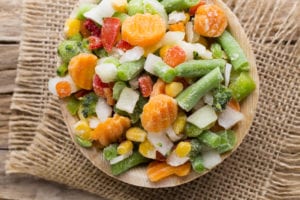Eating a diet loaded with vegetables is a great way to improve your health. However, when trying to maximize the nutritional value in your food its important know how your food is being stored.
Frozen vegetables are widely considered a more convenient and affordable alternative to fresh produce but does that convenience come at a cost to your health?
In this article we discuss whether frozen vegetables have lower nutritional values?
Are frozen vegetables healthy?

All vegetables are naturally packed with vitamins and minerals so eating any form of vegetable is better than none at all. But people still believe that frozen vegetables just aren’t healthy compared to fresh produce. We don’t know where this rumor started but we do know it isn’t true. Vegetables designated to be frozen are generally harvested and packaged at peak ripeness when they are at their most nutritious.
Before being froze vegetables have to be sanitized. By blanching them in steam or hot water you can kill bacteria and slow down decay. This process cleans the produce but some of the water-soluble nutrients like vitamin B and Vitamin C are lost in the process. However, this loss is not significant and a good portion of these vitamins will remain. The vegetables are flash frozen shortly after being sanitized which locks them in a nutrient rich state. A 2017 study in the Journal of Food Composition and Analysis actually found that there was no significant difference in vitamin contents from fresh to frozen storage. In fact, frozen produce generally outperformed fresh produce more often then not.
This study also explains how fresh produce can be a misleading term. Fresh produce in the grocery store is normally a few weeks old at least. This led to the term “Fresh Stored” which more accurately describes fresh produce. Now this doesn’t mean all vegetables are better off frozen and it certainly doesn’t mean fresh produce is bad for you. Over the past decade there have been dozens of scientific studies on the effect of freezing produce and researchers have found that nutritional value can vary from one vegetable to another!
When to choose frozen vegetables
Nothing looks quite as tasty, or as healthy as a fresh Garden Salad and the best time to eat that salad is when all of its ingredients are in season. If a vegetable is out of season it’s better to buy frozen.
Fresh stored vegetables are supposed to look good but out of season those vegetable are months old. Farms pick vegetables before they ripen so your produce still looks good when it finally gets to the shelf. When vegetables are picked early they never get the chance to develop all the nutrients of a fully ripe plant. During storage and transportation these vegetables are also exposed to excess heat and light which degrades more of the nutrients, especially delicate vitamins like vitamin C.
Fresh stored vegetables can become damaged, lose essential nutrients, and increase in cost while out of season. Its better for your health and your wallet to buy the frozen brands and simply try to get more creative in the kitchen.
When to choose fresh vegetables
Like we said before, nothing looks quite as tasty as a fresh Garden Salad and you can make it that much better using local ingredients.
Buying fresh ingredients from a farmer’s market, or the local section in your grocery store is an effective way to ensure your vegetables have spent as little time as possible sitting around. Less time siting around means less exposure to elements that can harm the nutrients in your food. Local food also has a higher likelihood of being picked at peak ripeness so you can maximize the nutritional value of each bite!
If you don’t have access to local produce don’t worry, simply making sure the vegetables you buy are in season can make the difference nutritionally.
The Takeaway
When choosing to eat vegetables its always important to see what’s in season. By knowing what vegetables are in season you can minimize the time your produce spends in storage and maximize the nutritional value of your food.
If specific vegetables are not in season choosing frozen can make sure you are maximizing the nutrients you receive.
However, for the most part, fresh and frozen vegetables are both healthy as long as you make an effort to incorporate them into your diet as much as possible!
Weight Loss Direct is dedicated to ensuring our clients and community can make achievable and effective changes after every article we post. If you are interested in how to apply our expertise to your life just sign up and become a member!

